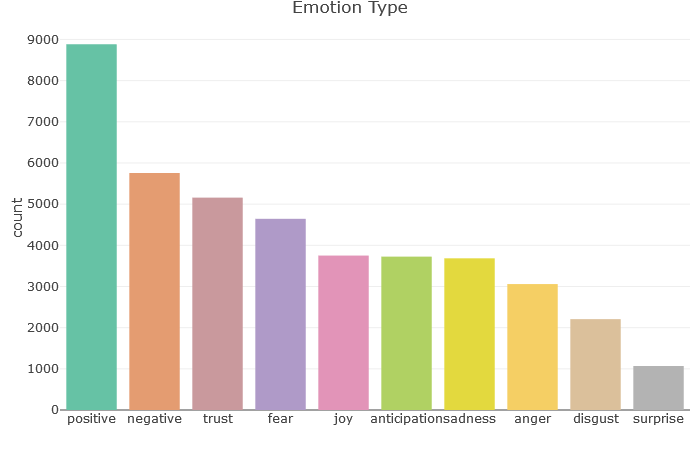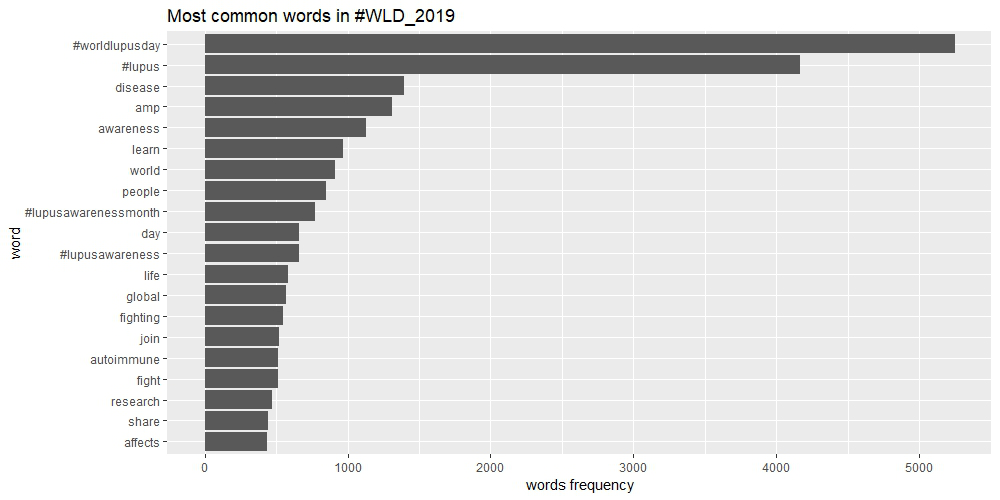Session Information
Date: Tuesday, November 12, 2019
Title: Patient Outcomes, Preferences, & Attitudes Poster II: Patient Preferences, Beliefs, & Experiences
Session Type: Poster Session (Tuesday)
Session Time: 9:00AM-11:00AM
Background/Purpose: Social media nowadays has the capacity to disclose sentiments and opinions difficult to obtain elsewhere. This is of valuable importance in the healthcare sector as social networks mechanism can offer clues for health professionals coming from patients communities who reveal and express their needs, sentiments, as well indicators of self-reported quality of life [1]. The present study aims at illustrating the potential of using data from social media to unlock feelings and social network dynamics related to Systemic Lupus Erythematosus (SLE). SLE is still challenging because of the variety and complexity of symptoms, its impact on patients’ quality of life. This study aimed at (1) collecting and analyzing tweets content using the (#) WorldLupusDay or #Lupus or #SLE released the 10th of May 2019; and at (2) using tweets text to compute sentiment score, explore main concepts and emotions, look at the most influencers’ sentiment score and the trends shared about SLE disease.
[1] W. C. Crannell, et. al. A pattern-matched Twitter analysis of US cancer-patient sentiments. J.of S. Res. (2016).
Methods: As hashtags are the way that Twitter users categorize messages, promote ideas, and follow topics, using Twitter’s public streaming API, all tweets released on the 10th of May 2019 worldwide and contain the hashtags #WorldLupusDay, #lupus and #SLE were used for the present analysis. Overall 6.162 tweets texts and account information (such as time, location, sources, followers count, friends count) created by 2.903 unique users account were extracted and used to perform a quantitative and qualitative analysis. The unique anonymous users’ id identification number was used to gather the tweets text for each user and sentiment score values (anger, anticipation, disgust, fear, joy, sadness, surprise, trust, negative, positive) for each user were calculated using the NRC Emotion Lexicon[2]analysis. R software was used to analyze the retrieved tweets data.
[2] Saif Mohammad, Peter Turney. Crowdsourcing a Word-Emotion Association Lexicon. C.. Intell; (2013).
Results: The most frequently words were Worldlupusday (n = 5247) lupus (n = 4165), disease (n = 1398) and amp (Accelerating Medicine Partnership; n = 773). The content analysis based on tweets text detected awareness, research/share and more than my SLE as frequently mentioned concepts in lupus world day tweets. Computed emotions values for all the tweets text collected revealed higher score in positive emotion (total score 8883; mean score = 1.4), and the lowers score in surprise emotion (total score 1068; mean score = 0.17). The overall distribution of the sentiment score tended to be more positive than negative with an average score of 0.57.
Conclusion: This study explored the potentiality of the social media network, in this case twitter, as a tool to identify users unmet needs and insights for sharing experience and feelings. Analyzing the emotions and sentiments score value evoked by terms identified in the users tweets text, a valuable picture of how users expressing themselves openly about their illness and perceptions on social media emerges, offering a possibility for gaining valuable insights of information missed using traditional tools for data collection.
To cite this abstract in AMA style:
Pirri S, Lorenzoni V, Trieste L, Talarico R, Palla I, Tani C, Elefante E, Cannizzo S, Triulzi I, Ticciati S, Turchetti G, Mosca M. The #Worldlupusday 2019 Across Twitter: An Explorative Analysis of Spreading Concepts and Sentiment Perceptions on Social Media [abstract]. Arthritis Rheumatol. 2019; 71 (suppl 10). https://acrabstracts.org/abstract/the-worldlupusday-2019-across-twitter-an-explorative-analysis-of-spreading-concepts-and-sentiment-perceptions-on-social-media/. Accessed .« Back to 2019 ACR/ARP Annual Meeting
ACR Meeting Abstracts - https://acrabstracts.org/abstract/the-worldlupusday-2019-across-twitter-an-explorative-analysis-of-spreading-concepts-and-sentiment-perceptions-on-social-media/



